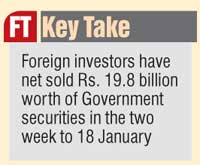Thursday Feb 19, 2026
Thursday Feb 19, 2026
Tuesday, 24 January 2017 00:01 - - {{hitsCtrl.values.hits}}
Reuters: stocks closed at their lowest in nearly two weeks on Monday led by diversified shares as concerns about rising interest rates and the ongoing political stability weighed on sentiment.
The Colombo stock index ended 0.12% down at 6,162.05, its lowest close since 10 January.
The index hit a two-week high on 13 January after the European Commission proposed increased market access for Sri Lanka as a reform incentive. “The uncertainty is still there and investors are still in wait-and-see mode as they are worried over the current uncertainty and interest rate volatility,” said Dimantha Mathew, head of research at First Capital Equities Ltd.
Foreign investors net sold Rs. 22.3 million ($ 148,518.15) worth of equities on Monday, extending the year-to-date net foreign outflow to Rs. 1.38 billion.
Turnover stood at Rs. 661.8 million. Shares in fixed-line telephone operator Sri Lanka Telecom Plc fell 0.28%, while market heavyweight John Keells Holdings fell 0.92%.
Rising market interest rates, which move in tandem with t-bill yields, have been a cause for concern, brokers said.
Yields on treasury bills rose 1-16 basis points at a weekly auction on Wednesday to a four-month high after the central bank governor signalled reduced intervention to defend the rupee.
Investors are also concerned about possible political uncertainty as the main coalition partners in the government are contesting local polls separately, analysts said.
Reuters: The Sri Lankan rupee ended weaker on Monday as importer dollar demand surpassed greenback sales by exporters, dealers said.
Rupee forwards were active, with two-week forwards ending at 150.90/151.10 per dollar, compared with Friday’s close of 150.85/151.00.
The dollar, however, traded weaker against major currencies on Monday after U.S. President Donald Trump struck a protectionist tone in his inauguration speech, offsetting optimism that he will follow through on promises of tax cuts and other stimulus.
The spot rupee was quoted around the Central Bank’s reference level of 150.15, dealers said.
“There was continued pressure (on the rupee) due to (dollar) demand from importers of commodities and petroleum,” a currency  dealer said, asking not to be named.
dealer said, asking not to be named.
Dealers also said exports could be hurt as severe drought hit the production of tea and other commodities.
The rupee has been under pressure due to rising imports and net selling of government securities by foreign investors, and a central bank decision to adjust the spot rupee reference rate to a record low of 150.15 rupees to the dollar.
Officials from the central bank were not immediately available for comment.
Sri Lanka’s Central Bank sold $ 458 million worth of development bonds on Thursday, and investors say they expect that to ease some pressure on the rupee.
Foreign investors have net sold Rs. 19.8 billion worth Government securities in the two week to 18 January, according to the latest Central Bank data.